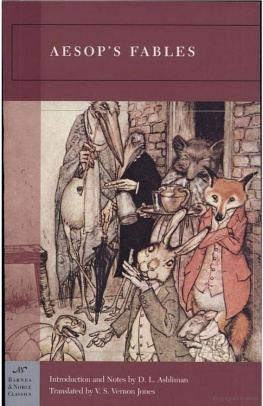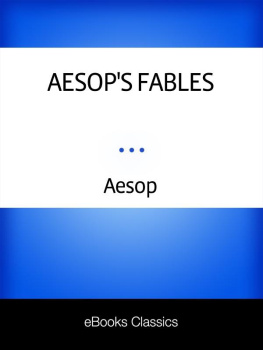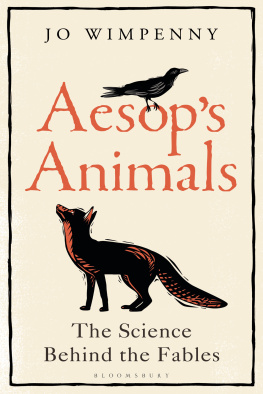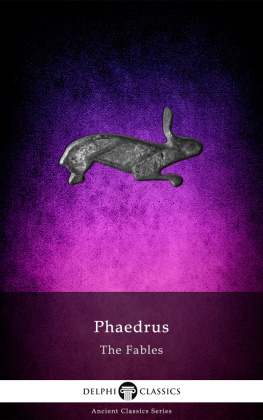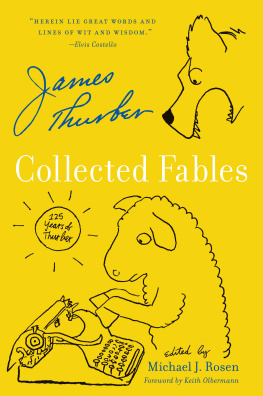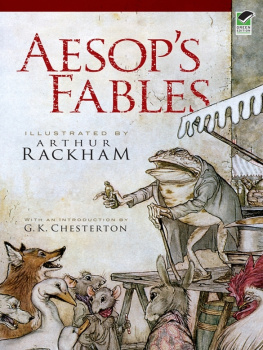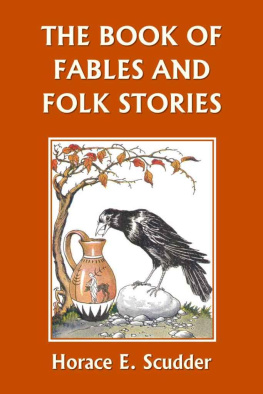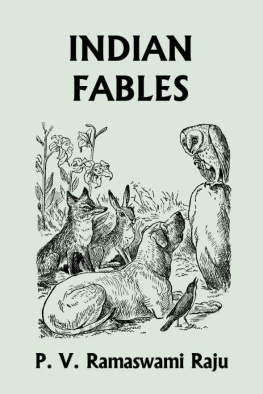AESOP probably lived in the middle part of the sixth century B.C. A statement in Herodotus gives ground for thinking that he was a slave belonging to a citizen of Samos called Iadmon. Legend says that he was ugly and misshapen. There are many references to Aesop found in the Athenian writers: Aristophanes, Xenophon, Plato, Aristotle and others. It is not known whether he wrote down his fables himself, nor indeed how many of them are correctly attributed to his invention.
OLIVIA TEMPLE was born in London and educated at a convent grammar school in Hertfordshire. She has published extracts from her diary and written articles and reviews for a variety of magazines. She is a figurative painter, with works in private collections in Europe, America, Hong Kong and New Zealand.
ROBERT TEMPLE has a degree in Sanskrit and is the author of eight books, including a history of Chinese science. He translated the Babylonian Epic of Gilgamesh, which was produced at the Royal National Theatre in London in 1993, and has published several articles about the scientific works of Aristotle. His book Conversations with Eternity includes studies of ancient Greek oracles and divination techniques. He is also a television drama producer.
The Complete Fables
AESOP
Translated by OLIVIA and ROBERT TEMPLE
With an Introduction by ROBERT TEMPLE
PENGUIN BOOKS
PENGUIN BOOKS
Published by the Penguin Group
Penguin Books Ltd, 27 Wrights Lane, London W8 5TZ, England
Penguin Putnam Inc., 375 Hudson Street, New York, New York 10014, USA
Penguin Books Australia Ltd, Ringwood, Victoria, Australia
Penguin Books Canada Ltd, 10 Alcorn Avenue, Toronto, Ontario, Canada M4V 3B2
Penguin Books India (P) Ltd, II, Community Centre,
Panchsheel Park, New Delhi 110 017, India
Penguin Books (NZ) Ltd, Private Bag 102902, NSMC, Auckland, New Zealand
Penguin Books (South Africa) (Pty) Ltd, 5 Watkins Street,
Denver Ext 4, Johannesburg 2094, South Africa
Penguin Books Ltd, Registered Offices: Harmondsworth, Middlesex, England
This translation first published in Penguin Classics 1998
9
Copyright Translation and Annotation, 1998 Robert and Olivia Temple
Copyright Introduction, 1998 Robert Temple
All rights reserved
The moral right of the translators has been asserted
Except in the United States of America, this book is sold subject to the condition that it shall not, by way of trade or otherwise, be lent, re-sold, hired out, or otherwise circulated without the publishers prior consent in any form of binding or cover other than that in which it is published and without a similar condition including this condition being imposed on the subsequent purchaser
9780141915784
For our godchildren
Camilla, Edward, Antony,
Niralie, Alice, Laurie,
Joshua and Benjamin
and also for Emma
Contents
Introduction
Aesops Fables what a ring it has to it! Of all the names of authors from Greek antiquity, Aesop is probably the best known, more so even than Homer. But it is ironical that Aesops reputation should be so high when so little is accurately known about him or his work and when no complete translation of his fables has ever existed in English. He is rather like a movie star everyone thinks they know him but in fact they only know him from certain roles he has played. The roles Aesop has played have been as a childrens storyteller and as a clothes-horse for Victorian morals such as haste makes waste and pride comes before a fall no such morals actually occur in Aesop at all. The animal stories which parents still buy in quantities for their childrens birthdays bear little resemblance to the real Aesop fables. I hesitate to say the real Aesop, because so little is known about the historical Aesop that some have maintained that he never actually existed.
It seems, however, that he did exist. Although the ancient Life of Aesop, which existed before the time of Plato, consists largely of fantasy episodes of an already legendary figure, serious scholars like Aristotle and his school made attempts to sort out the fact from fiction and came up with the conclusion that Aesop was not a Phrygian (from Asia Minor), as commonly believed in their day, but was actually a native of the town of Mesembria, in Thrace on the Greek mainland, and that he lived for some time on the Island of Samos. (This information survives in fragments of Aristotles lost Constitution of Samos.)
Aesop seems to have been a slave as a result of captivity. In Greek there were two different words for slaves, denoting whether a person had been born a slave (doulos) or had been captured in war and sold into slavery (andrapodon). Aesop was apparently in the latter category. But, despite this status, which rendered him liable to sale and deprived of all rights, Aesop appears to have lived the life largely of a personal clerk/secretary and even what we could call a confidential agent for his owners. He seems to have been a great wit, whose reputation for telling little animal tales in discussion and negotiation and scoring devastatingly clever points with them astonished and impressed his contemporaries. He thus became a legendary name around which all such witty animal tales clustered in later centuries, most of the surviving ones probably not actually written by him.
Aesop lived in the early sixth century BC, and one suggestion of his date of death is 564 BC, which may well be correct. One of the most famous courtesans of Greek antiquity was a woman named Doricha, better known by her nickname of Rhodopis, a Thracian who seems to have been seized in war at the same time as Aesop, since they became fellow-slaves. She (and possibly Aesop as well) was taken to Egypt, where she achieved fame all over the Mediterranean world for her irresistible beauty and charm. Charaxus of Mytilene in Lesbos, brother of the poetess Sappho, became infatuated with Rhodopis and bought her freedom at an enormous price. Charaxus was, at the time, engaged in a trading trip to Egypt, selling Lesbian wine. Sappho was furious with her brother because of this wild financial extravagance, and she wrote a poem ridiculing him. These historical facts help to anchor the dates of Aesop in some kind of chronological reality. The legends of Aesops association with King Croesus, on the other hand, appear to be pure fiction, as does a false story that Aesop went to Delphi and was thrown from a cliff while he was telling the fable of The Eagle and the Scarab Beetle, in this volume. (So widespread was the popular belief in this last episode that it is referred to by Aristophanes in The Wasps (1446) so briefly in passing that he clearly knows that his audience will be familiar with all the details of the story; that was in 422 BC.)
Since the best of the Aesop fables are full of wit and jest, it is not surprising that they were great favourites of the comic playwright Aristophanes. He refers to Aesop and some of his fables many times in his surviving plays. Some references are intriguing in the clues they give us as to the state of the Aesopic material in his time. In The Birds (470), written in 414 BC, one of his characters complains to another that he has not heard of the ancient lineage of the birds because youve a blind uninquisitive mind, unaccustomed to poring over Aesop. Thus we are led to presume that early collections of Aesop fables existed in book form. And two references in


